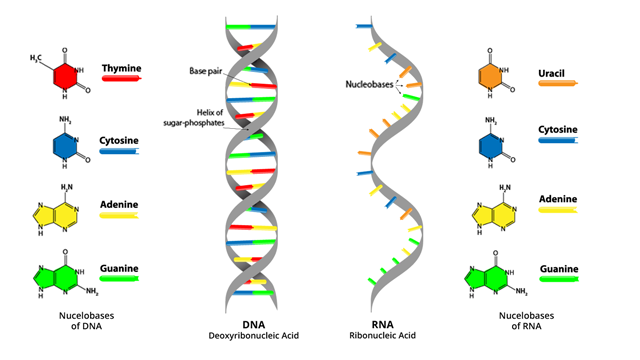
Genetics.
- ribonucleic acid: any of a class of single-stranded molecules transcribed from DNA in the cell nucleus or in the mitochondrion or chloroplast, containing along the strand a linear sequence of nucleotide bases that is complementary to the DNA strand from which it is transcribed: the composition of the RNA molecule is identical with that of DNA except for the substitution of the sugar ribose for deoxyribose and the substitution of the nucleotide base uracil for thymine.
noun
- biochem ribonucleic acid; any of a group of nucleic acids, present in all living cells, that play an essential role in the synthesis of proteins. On hydrolysis they yield the pentose sugar ribose, the purine bases adenine and guanine, the pyrimidine bases cytosine and uracil, and phosphoric acidSee also messenger RNA, transfer RNA, ribosomal RNA, DNA
1948, abbreviation of ribonucleic acid (see ribonucleic).
n.
- Ribonucleic acid; a polymeric constituent of all living cells and many viruses, consisting of a long, usually single-stranded chain of alternating phosphate and ribose units with the bases adenine, guanine, cytosine, and uracil bonded to the ribose. The structure and base sequence of RNA are determinants of protein synthesis and the transmission of genetic information.
- Short for ribonucleic acid. The nucleic acid that is used in key metabolic processes for all steps of protein synthesis in all living cells and carries the genetic information of many viruses. Unlike double-stranded DNA, RNA consists of a single strand of nucleotides, and it occurs in a variety of lengths and shapes. RNA also differs from DNA in having the pyrimidine base uracil instead of thymine and in having ribose instead of deoxyribose in its sugar-phosphate backbone. In eukaryotes, RNA is produced in the cell nucleus.♦ Messenger RNA is RNA that carries genetic information from the cell nucleus to the structures in the cytoplasm (known as ribosomes) where protein synthesis takes place.♦ Ribosomal RNA is the main structural component of the ribosome.♦ Transfer RNA is RNA that delivers the amino acids necessary for protein synthesis to the ribosomes. Compare DNA.
One of a group of molecules similar in structure to a single strand of DNA. The function of RNA is to carry the information from DNA in the cell‘s nucleus into the body of the cell, to use the genetic code to assemble proteins, and to comprise part of the ribosomes that serve as the platform on which protein synthesis takes place.
 Liberal Dictionary English Dictionary
Liberal Dictionary English Dictionary